New Debt Collection Legislation

In May of this year, Governor Ron DeSantis signed into law Senate Bill 232, which made some changes to the Florida Consumer Collections Practices Act (FCCPA). These changes cut off claims for relief for consumers and consumer protection law firms with respect to email communications. Due to the rising number of lawsuits that allege debt collectors have violated the “quiet hours,” outlined in the statute, specifically via emails sent after 9:00 p.m. or before 8:00 a.m. in the consumer’s local time zone, the amendment to the FCCPA clarifies that prohibited contact between the hours of 9:00 p.m. and 8:00 a.m. in debt collection does not include email communication. The revised section of the FCCPA (Fla. Stat. § 559.72(17)) now states that a creditor is prohibited to “communicate with the debtor between the hours of 9:00 p.m. and 8:00 a.m. in the debtor’s time zone without the prior consent of the debtor. This subsection does not apply to an email communication that is sent to an email address and that otherwise complies with this section” (emphasis added).
 In commentary surrounding the bill, the Florida Legislature “acknowledges that Florida Statute § 559.72 was adopted before email communication became commonly used, and that the only specific communication explicitly contemplated in such subsection is telephone calls.” Senate Bill 232 sought to “update and clarify prohibited practices in collecting debt to address email communication by excluding such communication from prohibited contact between the hours of 9:00 p.m. and 8:00 a.m. because such contact is less invasive and less disruptive than telephone calls.”
In commentary surrounding the bill, the Florida Legislature “acknowledges that Florida Statute § 559.72 was adopted before email communication became commonly used, and that the only specific communication explicitly contemplated in such subsection is telephone calls.” Senate Bill 232 sought to “update and clarify prohibited practices in collecting debt to address email communication by excluding such communication from prohibited contact between the hours of 9:00 p.m. and 8:00 a.m. because such contact is less invasive and less disruptive than telephone calls.”
The revised FCCPA is a welcome clarification for creditors defending against FCCPA lawsuits throughout the state of Florida in which it had been alleged that a violation based upon an email was made. However, it should be noted that law stated that it went into effect immediately but failed to address whether it was retroactive. So, the retroactive application of this amendment remains to be seen.
It should be noted, unlike the FDCPA, which excludes original creditors, the FCCPA provides broader protections by covering original creditors as well. The FCCPA provides for both regulatory enforcement and private causes of action by consumers harmed by violations. Penalties include actual damages, statutory damages up to $1,000 per action, punitive damages, injunctions, court costs, and attorney’s fees. Therefore, it is essential that the Credit Union stay abreast of the ever-changing landscape to ensure compliance and avoid costly litigation. I would encourage that every Credit Union review the Florida Consumer Collections Practices Act at least once a year. If you have questions, or if we can be of help, please reach out to a lawyer at our firm.
Florida Supreme Court Weighs in on Garnishment of Spousal Deposit Accounts

In a recent decision from the Florida Supreme Court, the high court addressed the protections of spousal accounts from garnishment. A garnishment, whether it be a continuing wage garnishment or a bank garnishment, is a common tool used by creditors for collecting on a judgment.
In Florida, certain protections can be afforded to real and personal property owned by a married couple. Property can be titled in one of three ways: tenants in common, joint tenants with rights of survivorship, or tenants by the entirety. Tenants by entirety only applies to a married couple. To qualify, it must meet the six unities, which are possession, interest, title, time, survivorship, and marriage.
In Beal Bank, SSB v. Almand & Associates, 780 So. 2d 45 (Fla. 2001), a seminal Florida Supreme Court decision, the high court held that a deposit account that meets the six unities and is held as tenants by the entirety can be protected from garnishment by a judgment creditor. The question arises about an account that does not meet the unity of time and title. It may not be uncommon for an individual to open a deposit account, later marry, and then add their new spouse to the account. In this scenario, a judgment creditor may argue that the unity of time and title are not met; thus, the account is subject to garnishment. This issue was very recently addressed and clarified by the Florida Supreme Court in Loumpos v. Bank One, Case No. SC2024-1256 (Fla. 2025).
In Loumpos, a judgment creditor obtained a judgment against an individual. Subsequent to the entry of the judgment, she married and was added to her husband’s already existing deposit account. As part of the process, they signed new signature cards that stated they owned the account as husband and wife. The judgment creditor then sought to garnish the account and argued that the debtor’s name was not on the account originally, so the unity of time and title were not met. In its analysis of the issue, the Supreme Court looked at both Beal Bank and Section 655.79 (1), Florida Statutes. This statute was amended in 2008, subsequent to the Court’s ruling in Beal Bank. Under Section 655.79 (1), Florida Statutes, for an account owned by two or more persons, there is a presumption that upon the death of any one person, all rights, title, interest, and claim in, to, and in respect of such deposit account, less all proper setoffs and charges in favor of the institution, vest in the surviving person or persons. In 2008, the following sentence was added: “Any deposit or account made in the name of two persons who are husband and wife shall be considered a tenancy by the entirety unless otherwise specified in writing.” The Court, when reading this sentence, found that a deposit account originally owned by an individual and then converted to a spousal account, can be held as tenants by the entirety, regardless of the unity of time and title.
It’s important to understand these spousal protections when contemplating a garnishment or other means of enforcing a judgment, as well as the protections afforded to your members. If you have questions about the ability to garnish a deposit account or protections for spousal accounts, please do not hesitate to contact one of the lawyers at SVL for legal advice.
Staff Spotlight on Gisselle Perez

Gisselle joined our team as an Associate Attorney on October 27, 2025. She is originally from Long Island, New York, but was raised in Central Florida. Gisselle earned her Bachelor of Science degree in Political Science and Economics from Florida State University in 2019. She then earned her Juris Doctor degree, cum laude, from Barry University School of Law in 2022.
Gisselle’s parents were born and raised in El Salvador before having to flee the Salvadoran civil war in the 1980s. Their origin story of coming to America is one of Gisselle’s biggest reasons of why she became a lawyer. In light of her family’s sacrifices, it is a privilege to pursue education, and she does not take her schooling and her degrees for granted. She always puts her best effort into anything she is working on and continuously looks for ways to grow both personally and professionally – we love this about her!
Gisselle is married to her husband Amado, who she says is her biggest supporter. Amado is an emergency department nurse and is currently studying at Seminole State College to complete his nursing (BSN) degree. Gisselle and Amado met when they were eighteen years old and will be celebrating their one-year wedding anniversary at the end of December!
In her spare time, away from work, she loves spending time with her husband and their Australian cattle dog, Moose. Gisselle loves a hot cup of chai and a cozy romance or fantasy book too! She also loves being active outdoors. You can often find her roller skating or doing pilates.
Gisselle, we are excited for you to be apart of our team. Welcome!
Staff Spotlight on Amelia Ziadie Hajer

Amelia joined our team as an Associate Attorney on October 27, 2025. She was born and raised in Kingston, Jamaica, and has also lived in Canada and the Cayman Islands. Amelia completed her first degree in Economics and Business at Agnes Scott College in Decatur, Georgia. She says this degree was especially useful in her legal practice, particularly in understanding financial matters, analyzing transactions, and approaching cases with a practical, business-minded perspective. Amelia also holds a law degree from the University of Liverpool and a Caribbean Legal Education Certificate. She practiced law in Jamaica for several years before moving back to Georgia after getting married. During this time, she returned to school and completed an LLM at Georgia State University and sitting for the Georgia Bar. She is valuable to Sorenson Van Leuven, as she is licensed in Georgia along with Jim and Tyler.
Amelia is married to her husband, Arcan. They have been married almost 10 years. They have two sons, ages 8 and 6. In her spare time, Amelia enjoys spending time with her dog, Pepper, a long hair chihuahua. She also enjoys going to the gym. Additionally, she loves to spend time in the kitchen cooking, exploring new foods and trying out recipes. Her and her husband get their culinary inspiration from cooking shows, travel videos on YouTube, as well as make each other’s family recipes that comprise of mostly Jamaican, Chinese, Lebanese, Kurdish, and other Middle Eastern dishes.
Amelia likes working with Credit Unions because they are so member-focused. She feels it is rewarding to support institutions that serve their communities. Amelia says with experience living and studying in Jamaica, the United States, Canada, and the Cayman Islands, she brings a multicultural perspective to her work and values clear, practical communication with our Credit Union clients and their members.
We are so happy to have you on our team, Amelia!
Halloween at the Office
 The staff of Sorenson Van Leuven enjoyed Halloween at the office on Friday, October 31, 2025. We had our annual costume contest, which included our Tallahassee and Mexico team. Congrats to our Winners: First Place: Sarah, as a pinata. Second Place: Ale, as a pirate. And Third Place: Noel, as an inflatable cow. We love making SVL a fun working environment.
The staff of Sorenson Van Leuven enjoyed Halloween at the office on Friday, October 31, 2025. We had our annual costume contest, which included our Tallahassee and Mexico team. Congrats to our Winners: First Place: Sarah, as a pinata. Second Place: Ale, as a pirate. And Third Place: Noel, as an inflatable cow. We love making SVL a fun working environment.






 The new system requires that each judicial circuit define three case management tracks: complex, general, and streamlined. The rule empowered the Chief Judge in each judicial circuit to issue administrative orders defining the deadlines for each track. Most collections court cases will fall under the streamlined track. Under the new rule, the streamlined track must address time periods and deadlines for the following: service of the complaints; adding a new party; completing discovery; filing a motion for summary judgment; and completing mediation.
The new system requires that each judicial circuit define three case management tracks: complex, general, and streamlined. The rule empowered the Chief Judge in each judicial circuit to issue administrative orders defining the deadlines for each track. Most collections court cases will fall under the streamlined track. Under the new rule, the streamlined track must address time periods and deadlines for the following: service of the complaints; adding a new party; completing discovery; filing a motion for summary judgment; and completing mediation.
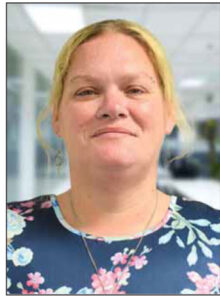
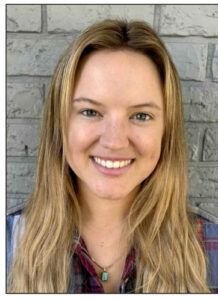
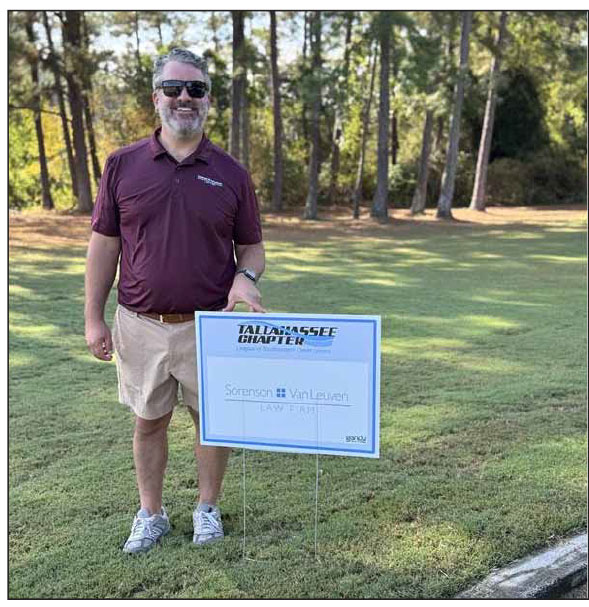 Sorenson Van Leuven was pleased to participate as a Gold Sponsor at the Tallahassee Chapter of Credit Union’s Golf Tournament on September 22, 2025. The event was held at Golden Eagle Country Club, in Tallahassee, Florida. Steve Orsillo represented the firm and had a great time playing in the tournament.
Sorenson Van Leuven was pleased to participate as a Gold Sponsor at the Tallahassee Chapter of Credit Union’s Golf Tournament on September 22, 2025. The event was held at Golden Eagle Country Club, in Tallahassee, Florida. Steve Orsillo represented the firm and had a great time playing in the tournament.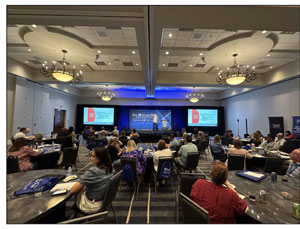 Sorenson Van Leuven was pleased to participate as a Gold Sponsor at the Tallahassee Chapter of Credit Union’s Golf Tournament on September 22, 2025. The event was held at Golden Eagle Country Club, in Tallahassee, Florida. Steve Orsillo represented the firm and had a great time playing in the tournament.
Sorenson Van Leuven was pleased to participate as a Gold Sponsor at the Tallahassee Chapter of Credit Union’s Golf Tournament on September 22, 2025. The event was held at Golden Eagle Country Club, in Tallahassee, Florida. Steve Orsillo represented the firm and had a great time playing in the tournament.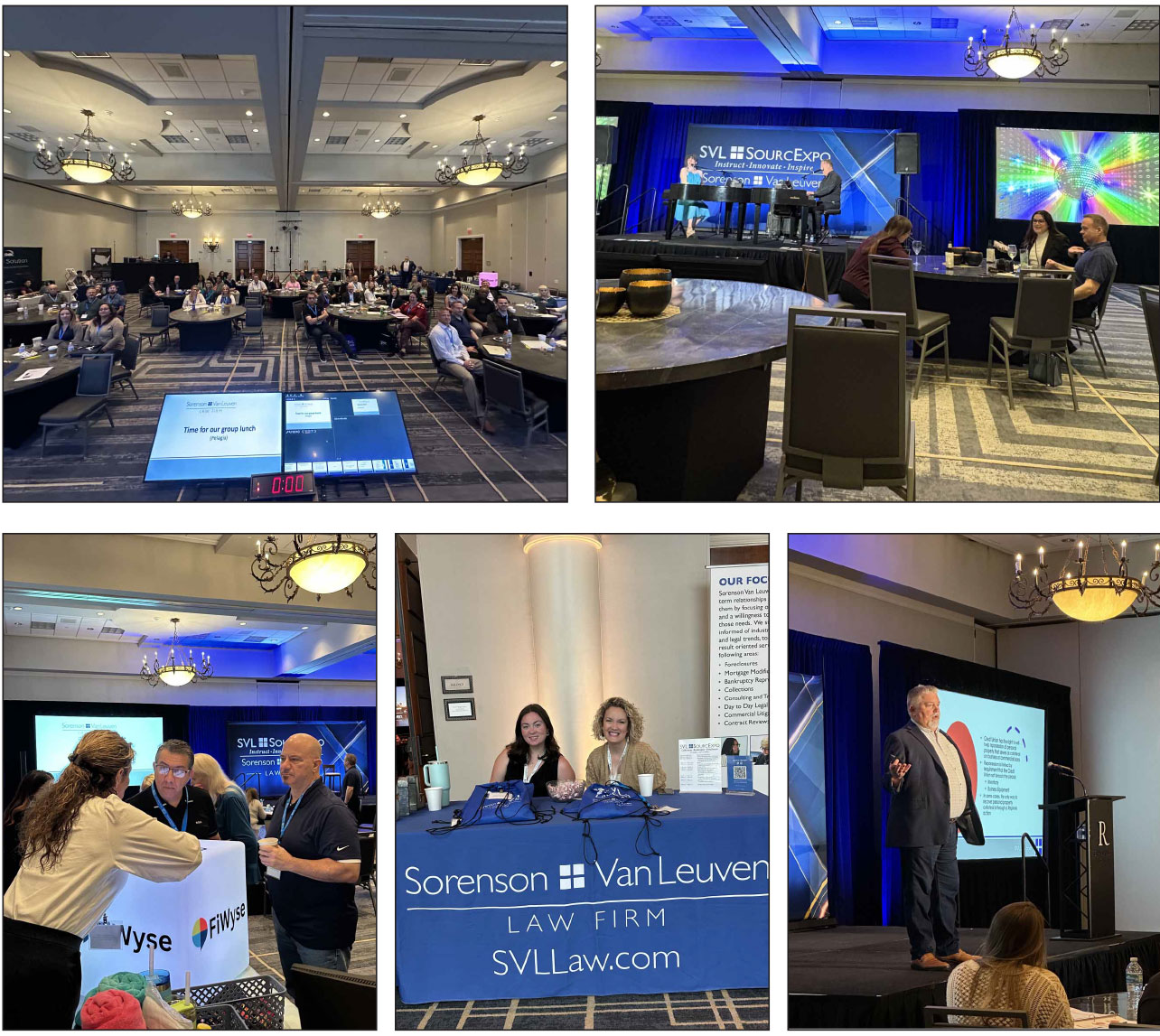
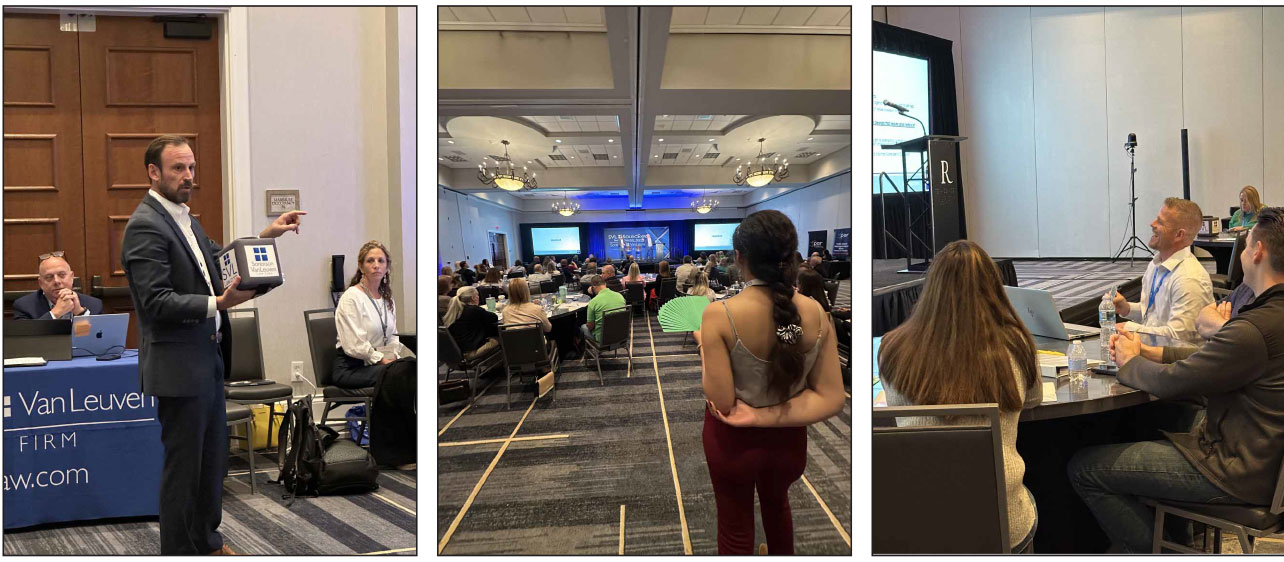
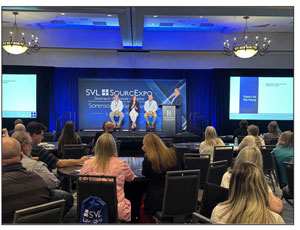 Ready to join us next year? We are excited to announce we will be hosting again in Tampa at the Renaissance International Plaza Hotal for our SVL SourcExpo 2026. The dates for next year’s conference will be July 15th-17th, 2026. Be sure to save the date and join us!
Ready to join us next year? We are excited to announce we will be hosting again in Tampa at the Renaissance International Plaza Hotal for our SVL SourcExpo 2026. The dates for next year’s conference will be July 15th-17th, 2026. Be sure to save the date and join us!
 In a Chapter 7 “no-asset” case, where the bankruptcy trustee determines there are no assets to distribute to creditors, courts generally hold that all dischargeable debts are wiped out—even if the creditor didn’t receive notice. This is based on the idea that filing a proof of claim wouldn’t have changed the outcome, so the lack of notice caused no practical harm.
In a Chapter 7 “no-asset” case, where the bankruptcy trustee determines there are no assets to distribute to creditors, courts generally hold that all dischargeable debts are wiped out—even if the creditor didn’t receive notice. This is based on the idea that filing a proof of claim wouldn’t have changed the outcome, so the lack of notice caused no practical harm.

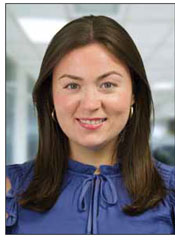
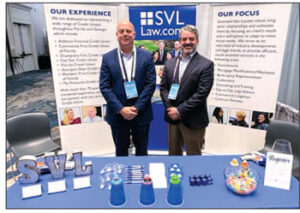 Our firm attended the ENGAGE Conference in Orlando on June 17-June 20 and we had a great time visiting with our Credit Union clients and seeing all of you there. We also had the opportunity to host a booth inside the exhibit hall where we are able to interact and network, as well. This event is always one we look forward to each year.
Our firm attended the ENGAGE Conference in Orlando on June 17-June 20 and we had a great time visiting with our Credit Union clients and seeing all of you there. We also had the opportunity to host a booth inside the exhibit hall where we are able to interact and network, as well. This event is always one we look forward to each year.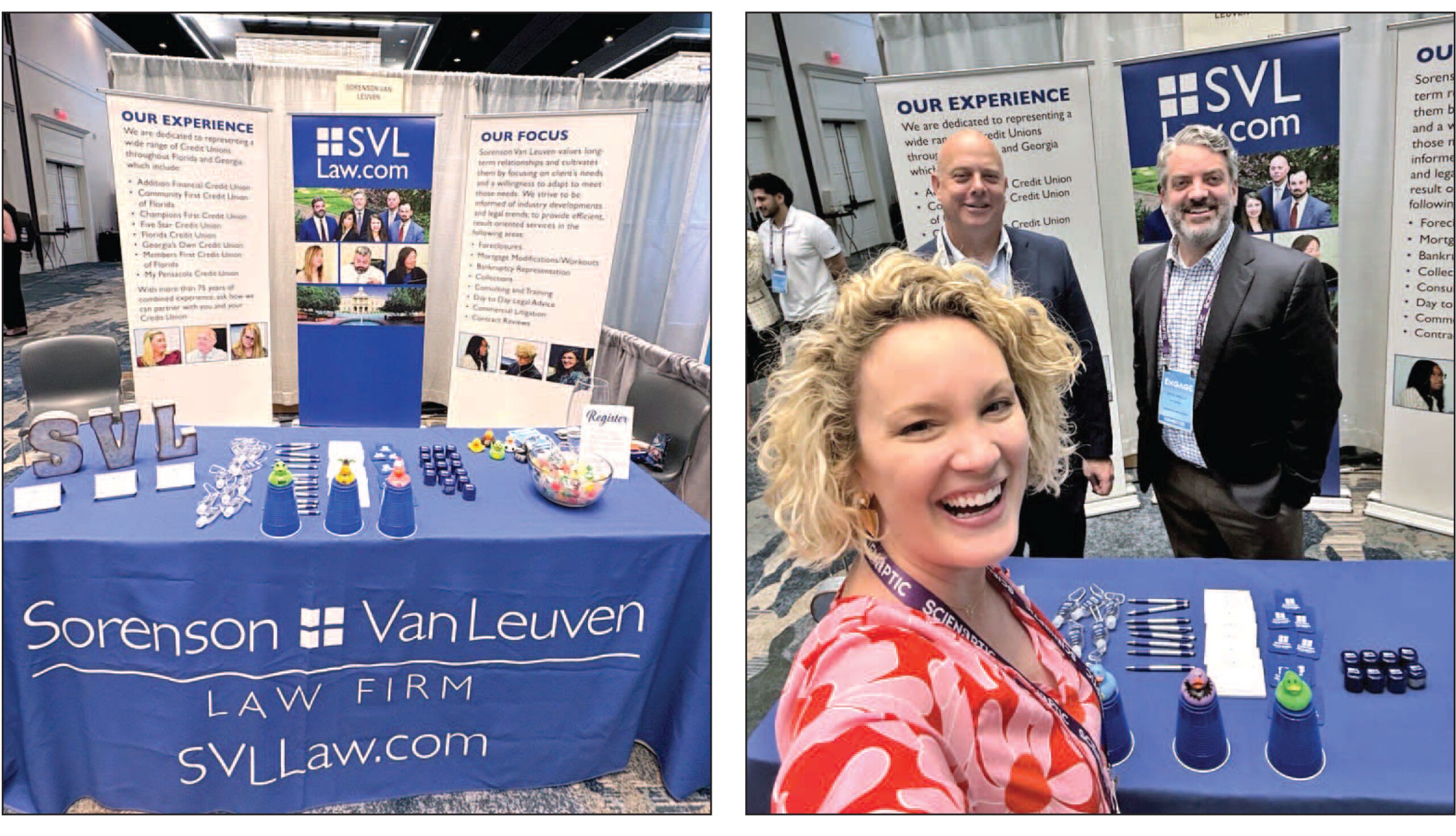


 In Quinn-Davis, the debt collector sent an e-mail to the debtor at 8:23 p.m. It was received in the debtor’s e-mail inbox at 10:14 p.m. but was not opened by the debtor until 11:44 a.m. The debtor sought to bring a class action lawsuit against the debt collector alleging that the e-mail violated the FCCPA in that it was sent between the hours of 9:00 p.m. to 8:00 a.m. in the time zone of the debtor. To prevail under this claim, the debtor must show (1) debtor was the object of a collection activity arising from a consumer debt, (2) the debt collector is a “person” under the FCCPA, and (3) whether the debt collector engaged in an act or omission prohibited by the FCCPA. The Court found “communicate with” is “the conveying of information regarding a debt directly or indirectly to any person through any medium.” In this case, the debt collector only communicated with the debtor when they opened the e-mail from the debt collector and not when the e-mail was sent or received.
In Quinn-Davis, the debt collector sent an e-mail to the debtor at 8:23 p.m. It was received in the debtor’s e-mail inbox at 10:14 p.m. but was not opened by the debtor until 11:44 a.m. The debtor sought to bring a class action lawsuit against the debt collector alleging that the e-mail violated the FCCPA in that it was sent between the hours of 9:00 p.m. to 8:00 a.m. in the time zone of the debtor. To prevail under this claim, the debtor must show (1) debtor was the object of a collection activity arising from a consumer debt, (2) the debt collector is a “person” under the FCCPA, and (3) whether the debt collector engaged in an act or omission prohibited by the FCCPA. The Court found “communicate with” is “the conveying of information regarding a debt directly or indirectly to any person through any medium.” In this case, the debt collector only communicated with the debtor when they opened the e-mail from the debt collector and not when the e-mail was sent or received.


 On January 9, 2025, we had our first ever Day of Celebration! At the event, we celebrated the wins and accomplishments of 2024. It was held at the University Center Club at Doak Campbell Stadium. We had a catered firm-wide lunch with games and prizes following. Our remote employees joined us via Zoom, which was a great addition! We look forward to 2025 and what is ahead for SVL.
On January 9, 2025, we had our first ever Day of Celebration! At the event, we celebrated the wins and accomplishments of 2024. It was held at the University Center Club at Doak Campbell Stadium. We had a catered firm-wide lunch with games and prizes following. Our remote employees joined us via Zoom, which was a great addition! We look forward to 2025 and what is ahead for SVL.

 Under Rule 1.202, parties are required to confer before filing non-dispositive motions (typically related to discovery or amending pleadings), promoting collaboration and the resolution of disputes without judicial intervention. Notably, parties are not required to confer on motions for summary judgment, nor those seeking injunctive relief. The duty is imposed upon the moving party to ensure a meet and confer occurs prior to the filing of the motion. The movant is also required to file a Certificate of Conferral with the motion, addressing the date and means of the conference and whether there was an agreement as to the relief sought and the efforts made to obtain such an agreement.
Under Rule 1.202, parties are required to confer before filing non-dispositive motions (typically related to discovery or amending pleadings), promoting collaboration and the resolution of disputes without judicial intervention. Notably, parties are not required to confer on motions for summary judgment, nor those seeking injunctive relief. The duty is imposed upon the moving party to ensure a meet and confer occurs prior to the filing of the motion. The movant is also required to file a Certificate of Conferral with the motion, addressing the date and means of the conference and whether there was an agreement as to the relief sought and the efforts made to obtain such an agreement.



 Finally, the proposed rule seeks to change some notice requirements. Servicers would be required to provide additional information in written early intervention notices, including the name of the owner of the mortgage loan, a description of each type of loss mitigation option that is generally available, and a reference to a website where the borrower can access a list of all loss mitigation options that may be available. When it comes to loss mitigation determination notices, the proposed rule would require that servicers provide a written response that includes key “borrower-provided inputs” that served as a basis for the determination, a list of other loss mitigation options that are still available, and the next steps that the borrower must take to be reviewed for these options. The notice must inform the borrower if the borrower has been reviewed for all available options and that no options remain. Additionally, specific notices must be provided in Spanish.
Finally, the proposed rule seeks to change some notice requirements. Servicers would be required to provide additional information in written early intervention notices, including the name of the owner of the mortgage loan, a description of each type of loss mitigation option that is generally available, and a reference to a website where the borrower can access a list of all loss mitigation options that may be available. When it comes to loss mitigation determination notices, the proposed rule would require that servicers provide a written response that includes key “borrower-provided inputs” that served as a basis for the determination, a list of other loss mitigation options that are still available, and the next steps that the borrower must take to be reviewed for these options. The notice must inform the borrower if the borrower has been reviewed for all available options and that no options remain. Additionally, specific notices must be provided in Spanish.


 On July 10-12, 2024, Sorenson Van Leuven held a successful SVL SourcExpo Conference at the Renaissance International Plaza Hotel in Tampa. We want to thank everyone who attended – the SVL team thoroughly enjoyed our time spent with each of you. We would also like to thank our sponsors: Allied Solutions, South Bay Remarketing Services, SWBC and United Solutions Company.
On July 10-12, 2024, Sorenson Van Leuven held a successful SVL SourcExpo Conference at the Renaissance International Plaza Hotel in Tampa. We want to thank everyone who attended – the SVL team thoroughly enjoyed our time spent with each of you. We would also like to thank our sponsors: Allied Solutions, South Bay Remarketing Services, SWBC and United Solutions Company.


 On February 14, 2024, the Fourth DCA, in Desbrunes v. US Bank N.A., 2024 Fla. App. LEXIS 1092, held that the known and unknown heirs is not always a necessary and proper party to a foreclosure. In Desbrunes, the borrower passed away during pendency of the foreclosure. The Plaintiff sought to substitute the known and unknown heirs and appoint a guardian ad litem. The trial court entered final judgment of foreclosure, but upon appeal the Court initially held that the inclusion of the known heirs and unknown heirs was improper. In reaching its initial ruling the Court found that when the borrower and owner is deceased, the proper party is the estate’s legal representative appointed by a probate court, which in most cases is a personal representative, and not someone appointed by the foreclosure court or the heirs. When there is no estate or legal representative, the proper step is to petition for administration of the estate as a creditor. Upon a request for rehearing, the Court clarified its ruling by distinguishing between homestead and non-homestead property. In Florida, homestead property is not property of the estate and passes outside the estate. If the property is non-homestead, then it does become property of the Estate. Based on this clarification and the facts of the case, the Court reversed its ruling and found that final judgment of foreclosure was proper as the property was homestead. Desbrunes v. US Bank N.A., 2024 Fla. App. LEXIS 3570. However, had the property been non-homestead, the Court’s initial ruling would likely have been upheld to find that a legal representative of the estate must be added to represent the interest of the deceased borrower.
On February 14, 2024, the Fourth DCA, in Desbrunes v. US Bank N.A., 2024 Fla. App. LEXIS 1092, held that the known and unknown heirs is not always a necessary and proper party to a foreclosure. In Desbrunes, the borrower passed away during pendency of the foreclosure. The Plaintiff sought to substitute the known and unknown heirs and appoint a guardian ad litem. The trial court entered final judgment of foreclosure, but upon appeal the Court initially held that the inclusion of the known heirs and unknown heirs was improper. In reaching its initial ruling the Court found that when the borrower and owner is deceased, the proper party is the estate’s legal representative appointed by a probate court, which in most cases is a personal representative, and not someone appointed by the foreclosure court or the heirs. When there is no estate or legal representative, the proper step is to petition for administration of the estate as a creditor. Upon a request for rehearing, the Court clarified its ruling by distinguishing between homestead and non-homestead property. In Florida, homestead property is not property of the estate and passes outside the estate. If the property is non-homestead, then it does become property of the Estate. Based on this clarification and the facts of the case, the Court reversed its ruling and found that final judgment of foreclosure was proper as the property was homestead. Desbrunes v. US Bank N.A., 2024 Fla. App. LEXIS 3570. However, had the property been non-homestead, the Court’s initial ruling would likely have been upheld to find that a legal representative of the estate must be added to represent the interest of the deceased borrower.
 Sorenson Van Leuven participated in the 24th Annual Friends of the NMCRS Charity Golf Tournament on April 5, 2024. This is an annual Golf Tournament in Pensacola, Florida, proudly supporting the Navy-Marine Corps Relief Society, Inc. The mission of this organization is to provide “financial assistance and educate service members to become financially self-sufficient and better managers of their personal finances.” Attorneys Steve Orsillo and Blair Boyd had a great time playing in this tournament and supporting the cause.
Sorenson Van Leuven participated in the 24th Annual Friends of the NMCRS Charity Golf Tournament on April 5, 2024. This is an annual Golf Tournament in Pensacola, Florida, proudly supporting the Navy-Marine Corps Relief Society, Inc. The mission of this organization is to provide “financial assistance and educate service members to become financially self-sufficient and better managers of their personal finances.” Attorneys Steve Orsillo and Blair Boyd had a great time playing in this tournament and supporting the cause. On April 22, 2024, Sorenson Van Leuven participated in Gulf Winds Credit Union’s first charitable golf tournament called the Chip in Fore in Pace, FL. This event raised more than $33,000 with the support of the golfers, sponsors, and donations. It was a great day for networking, fun, and providing support to over 20 local non-profit organizations in the area. Tyler Van Leuven and Blair Boyd were in attendance at this event.
On April 22, 2024, Sorenson Van Leuven participated in Gulf Winds Credit Union’s first charitable golf tournament called the Chip in Fore in Pace, FL. This event raised more than $33,000 with the support of the golfers, sponsors, and donations. It was a great day for networking, fun, and providing support to over 20 local non-profit organizations in the area. Tyler Van Leuven and Blair Boyd were in attendance at this event.







 In 2011, the law changed how interest applies to Florida judgments in two major ways. First, the law now reads that the rate of interest will be adjusted by the Chief Financial Officer on each quarter (on January 1, April 1, July 1, and October 1) of each particular year. The second major change in the law was that, not only does the amount of interest change quarterly, the rate of interest that applies to a particular already established judgment will vary quarterly until the judgment is paid in full. The statute is clear that nothing in the statute shall affect the rate of interest that is set in a contract.
In 2011, the law changed how interest applies to Florida judgments in two major ways. First, the law now reads that the rate of interest will be adjusted by the Chief Financial Officer on each quarter (on January 1, April 1, July 1, and October 1) of each particular year. The second major change in the law was that, not only does the amount of interest change quarterly, the rate of interest that applies to a particular already established judgment will vary quarterly until the judgment is paid in full. The statute is clear that nothing in the statute shall affect the rate of interest that is set in a contract. The Consumer Financial Protection Bureau (“CFPB”) has recently issued two advisories on the Fair Credit Reporting Act (“FCRA”). The CFPB was formed around twelve years ago in response to the Great Recession and serves as an aid to consumers in the financial sector. In addition to serving consumers, the CFPB is also responsible for supervising financial institutions, including Credit Unions. This supervision includes issuing guidance and interpreting certain legislation.
The Consumer Financial Protection Bureau (“CFPB”) has recently issued two advisories on the Fair Credit Reporting Act (“FCRA”). The CFPB was formed around twelve years ago in response to the Great Recession and serves as an aid to consumers in the financial sector. In addition to serving consumers, the CFPB is also responsible for supervising financial institutions, including Credit Unions. This supervision includes issuing guidance and interpreting certain legislation. For example, if a consumer had an eviction proceeding commence on May 20, 2020, and that eviction proceeding was dispensed on June 20, 2020, the seven-year timeframe would run from the May 20, 2020, date, not the June 20, 2020, date. The CFPB advised that this clarification was intended to promote data accuracy. The CFPB noted that some states had inconsistent procedures for reporting disposition of certain matters that led to uncertainty in consumer reports.
For example, if a consumer had an eviction proceeding commence on May 20, 2020, and that eviction proceeding was dispensed on June 20, 2020, the seven-year timeframe would run from the May 20, 2020, date, not the June 20, 2020, date. The CFPB advised that this clarification was intended to promote data accuracy. The CFPB noted that some states had inconsistent procedures for reporting disposition of certain matters that led to uncertainty in consumer reports.
